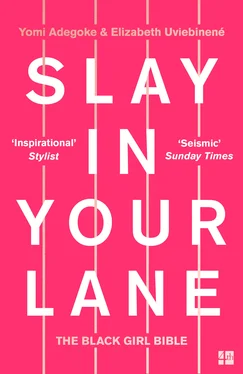A second reason, as Alexis’s experience shows, is a lack of awareness from parents, who were often educated outside the UK and so are unfamiliar with the differences between certain educational establishments and courses. But having a parent in the know doesn’t always mean they will be best placed to help you choose a university that is right for you: parents often simply assume that the higher up the league tables it is, the better it will be for you. Afua had a mother who knew all about the prestige of the university she was applying to, but this meant that Afua’s reasons for choosing Oxford were based on her mother’s preferences and not on how well suited she might be to it:
‘Why did I decide to apply to Oxford? It’s simple: African mum. It was “You are going to try to get into that university” and I have to say, I didn’t fully get it. I just didn’t get what the big deal was. I wanted to go to LSE. As far as I was concerned it was in the top five. I didn’t really understand. I didn’t really grow up in a proper establishment-type home so I just didn’t get the extra advantage that came with Oxbridge. I kind of applied to humour my mum because she found it so important, and I got in. I just didn’t see myself as an Oxford person, it didn’t really occur to me that I would get in and that all links back to the stereotypes. When I thought of Oxford, when I pictured Oxford, I did not see myself; I saw posh white people so I didn’t think I’d get in. I didn’t take it seriously and then when I got in, I had a complete crisis because I went to a private school and it was very white and I’d been literally counting down the days until I could get away from it.
‘I didn’t get the academic advantages of it but I definitely got the social implications, which was that I’d be cut off from the community, that’s what I felt. I’d be cut off from my whole scene, I was really into music journalism and I was in the new scene in London. I’d really worked hard to get away from the straightjacket of growing up in a very white area, so it was a big setback for me, that was my main concern. I just didn’t have any positive things to counter it at the time.’
Perhaps the most important reason, as we’ve looked at in the previous chapter, is a lack of incentive to apply to these universities in the schools these students are coming from. Without this, very few pupils can believe that a Russell Group uni or Oxbridge is something within their reach – for many, the idea is nothing more than a pipe dream. While there are, of course, black children who attend private schools, the majority are state-educated. This becomes particularly meaningful when you consider that between 2007 and 2009 just five schools in England sent more pupils to Oxford and Cambridge (946 in all) than nearly 2,000 other schools combined. Four of those five schools were private. 35The 2,000 lower-performing schools sent a total of 927 students between them to the two elite universities. Many of these schools sent no pupils at all, or on average fewer than one per year.
Afua, who mentored school children while she was at uni, describes the black pupils she met at state schools telling her that her university was a place they could never even dream of aspiring to:
‘We all did mentoring talks in the summer. We would go to inner-city state schools and talk to kids and we were trying to say that whatever perspective you have of Oxford, it is like that but you can find yourself there. We would get them kind of motivated and interested and then at the end they’d ask, “What grades did you need to get in?” and I’d be like, “3 As” and they just looked completely deflated because no one at their school had ever got 3As, ever. It was unheard of. So then you just think, what’s the point of going round to all these places when they’re dealing with such a bigger structural unfairness? Oxford is very slow in recognising that a student at a really tough state school who gets Bs is possibly a better student and more talented than a student at a private school who gets 3 As, and I think other universities have been quicker to recognise that.’
Heidi Mirza also talks about the importance of these initiatives in raising the aspirations of young, black, largely working-class children:
‘The universities in the States, like Cornell and Princeton, are going into primary schools in black communities and telling kids about universities from a very young age so that universities aren’t seen as some kind of out-of-reach places; they’re actually part of a mindset. And they’ve actually invested money in these programmes.’
Andrew Pilkington, Professor of Sociology at the University of Northampton, makes the important point that for the last few years ‘the primary concern of widening participation strategies was social class’. Because of this, the important intersection of class and race has been ignored, and overlooked by policymakers. Therefore issues specifically affecting black members of the student body have been largely neglected.
The fact that there are more black students at university than any other ethnic group is largely as a result of how we view education. For many of us, as Elizabeth pointed out earlier, education is often posited as the antidote to racism. We believe we can educate ourselves out of inequality with the right qualifications and grades. But while education, especially higher education, can indeed do wonders for social mobility, it is unfortunately the case that inequality is still present on the way up. In order to get into university in the first place, black students must do better than their white peers, and they are still less likely to get into the more prestigious institutions, regardless of their A-level results. 36As Dr Omar Khan, the Director of the Runnymede Trust, says: ‘What message does that send to young people who have heard for decades now that “education, education, education” will ensure their equal opportunities in the labour market?’
Even more alarmingly, after they have jumped through the hoops to reach university, black students will, on average, leave with lower university grades than their white peers. These are students who have proved by their A-levels that they have the ability to thrive in the world’s most elite institutions, but they fall short once they arrive. There has been little research into why this happens, but several of the issues discussed above – a lack of understanding surrounding the inevitable culture shock, multiple microaggressions at the hands of peers and staff – are likely to play a part. In 2010, 67.9 per cent of white students gained a first-class or upper-second-class degree at university compared to only 49.3 per cent of BAME students who entered with the same grades. Black students underperform compared to all other groups, 37and this occurs regardless of the type of university they attend, while 72 per cent of white students who started university with A-levels of BBB in 2014 got a first or 2:1, compared with 53 per cent of black students. 38Furthermore, despite an overall increase of BAME students in higher education, 39they are still less likely to find jobs that match their education level once they leave, or to progress to professorships. 40British ethnic minority graduates are between 5 and 15 per cent less likely to be employed than their white peers – and as if that wasn’t enough of a blow, for ethnic minority female graduates in particular, there are large disparities between their wages and those of their white counterparts. The same study shows that three and a half years after they have left university, the difference in earnings between ethnic minorities – especially women – and their white peers actually increases.
Even if they are from similar socioeconomic backgrounds, grow up with similar opportunities and have similar qualifications, ethnic minority graduates are less likely to be employed than white British graduates. So at present, black female students are paying £9,000 – and rising – for a much poorer university experience than their peers. And then, post-uni, they are also being short-changed in their earnings, making it even more difficult for them to pay off those rising fees.
Читать дальше












